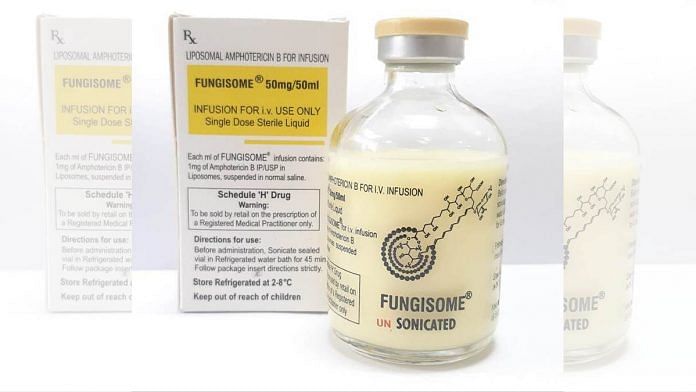New Delhi: While patients jostle to find the drug, Liposomal Amphotericin B, which treats black fungus, workers at Lifecare Innovations, a Gurugram-based pharmaceutical firm, have been working round the clock to manufacture it.
Lifecare Innovations was the first company to develop and manufacture the anti-fungal drug Liposomal Amphotericin B, which has recently come into the spotlight as a treatment for black fungus, known as mucormycosis.
In the past few weeks, hundreds of cases of the rare fungal infection have been reported across the country in recovered Covid patients. Among other reasons, the indiscriminate use of oral steroids in the treatment of these patients whose immune systems are compromised, is being blamed for the spurt in cases.
According to the industry experts, during pre-Covid times, the demand for this drug was very limited, not exceeding a lakh of vials every year. Therefore, pharmaceutical companies were manufacturing it only in limited quantities. Furthermore, the manufacturing process of this drug is also complex.
Today there are several manufacturers of the product in the market including Mylan, Cipla, Sun Pharma and Intas but it was Lifecare Innovations that first began manufacturing it in India
Run by doctor couple Dr Jitendra N. Verma and Dr Lilly Verma, the company first introduced the technique to manufacture Liposomal Amphotericin B in India about two decades ago. In 2009, this drug, branded as Fungisome, was distinguished as the top pharma innovation of the decade in the country.
“During the first wave, mucormycosis cases were limited in numbers and area and did not require any significant boost in production of the drug,” Dr Jitendra Verma told ThePrint.
“However, in the second wave the increase was very high and too sudden. We immediately increased production by running longer shifts and even on otherwise weekly off days. Now with expansion of capacity, the production will rise several folds,” he said without divulging the details on his company’s production capacity.
According to health ministry data, in May, the six pharma companies have been able to produce 1.63 lakh vials of the drug in the past month. This is expected to increase to 2.55 lakh vials in the month of June.
Also read: Delhi has recorded 1,044 black fungus cases and 89 deaths, says Satyendar Jain
How Lifecare Innovations was founded
Dr Jitendra, chief executive officer of Lifecare Innovations, started making liposomes — a tiny bubble made of strategic mix of lipids that can be used as a drug delivery vehicle — when he joined PGIMER Chandigarh in May 1977, as a research fellow and later obtained a PhD.
“Soon after PhD, I moved to the US and worked at University of Pennsylvania, Northwestern, and Georgetown University where I made liposomes for experimental use,” he told ThePrint.
The couple worked in the US universities and institutions for several years and in 1990, they decided to return to India and engaged in research and innovation here.
“I am a liposome technologist and perhaps 44 years of indulgence with liposome research makes me the longest experienced living liposome technologist in the world,” he claims.
In his last assignment in the US, at Army Medical Research Institute, he employed liposome technology for product development where his research contributed to the development of liposomal malaria vaccine.
“Our research findings were first to establish in 1990 that in addition to giving an antibody response, liposomal vaccines give cellular immune response that is essential to confer protective immunity to the vaccine,” said Jitendra.
He further noted that after returning to India, the doctor duo developed and commercialised Liposomal Syphilis Test – the first liposomal product developed and made in India.
“One success led to another opportunity and we developed Liposomal Amphotericin B in saline,” he added.
Lifecare Innovations was formed in 2000, along with his wife, surgeon Dr Lilly, and commercialisation of the drug was supported by a grant-turned-loan by Department of Scientific and Industrial Research (DSIR) under PATSER (Program Aimed at Technological Self-Reliance).
India’s first Liposomal Amphotericin B was launched on National Technology Day in 2003.
Also read: You can’t treat severe Covid, black fungus but can prevent risk factor in both — diabetes
What is Amphotericin B?
Amphotericin B is the key drug required to treat mucormycosis that damages the nose, eyes, sinuses, and sometimes even the brain. The demand is especially acute for Amphotericin B of Liposomal formulation.
Current evidence suggests that Liposomal Amphotericin B is less lethal for kidneys than conventional Amphotericin B.
Jitendra explained: “Amphotericin B ironically is so extremely toxic to kidneys that it is nicknamed Ampho-the-terrible. Indian drug uniquely prepared in saline has no significant toxicity. It is a strategically designed formulation for targeted delivery of Amphotericin B to fungal pathogen while avoids its interaction with kidneys transforming Ampho-the-terrible to Ampho-the-terrific.”
“Dearth of safe, potent broad-spectrum anti-fungal drug that does not have drug resistance problem has been a major challenge for those involved in drug discovery and development,” he added.
“Liposomal Amphotericin B in saline meets all the requirements of an ideal anti-fungal drug. The first anti-fungal compound potassium iodide was identified in 1903 and after a century in 2003 Fungisome was launched,” the doctor further noted.
Treatment with Amphotericin, according to medical experts, in some cases continues for four to six weeks, which may require 70 to 100 injections of the drug. The treatment is expensive as Liposomal drugs cost around Rs 7,500 whereas non-Liposomal formulations range from Rs 450 to Rs 3,500.
Also read: For once, Bihar is fully stocked with black fungus drug. But that’s due to an old failure



